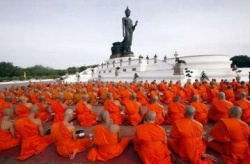Difference between revisions of "Kāyagatāsati Sutta"
m (1 revision: Adminos 7 october) |
|||
| Line 4: | Line 4: | ||
[[Kāyagatāsati Sutta]] | [[Kāyagatāsati Sutta]] | ||
| − | Preached at [[Jetavana]], on how to cultivate [[mindfulness]] of [[body]] so that it may produce abundant fruit and the ten blessings that result there from (M.iii.88ff). | + | [[Preached]] at [[Jetavana]], on how to cultivate [[mindfulness]] of [[body]] so that it may produce abundant fruit and the ten [[blessings]] that result there from (M.iii.88ff). |
This [[sutta]], like the [[ānāpāpa]], is really only a sectional presentation of the [[Satipatthāna Sutta]]. | This [[sutta]], like the [[ānāpāpa]], is really only a sectional presentation of the [[Satipatthāna Sutta]]. | ||
| − | For the special nature of this [[sutta]] see the [[Vibhanga]] Commentary (p.226). | + | For the special [[nature]] of this [[sutta]] see the [[Vibhanga]] Commentary (p.226). |
---------------------------------------------------- | ---------------------------------------------------- | ||
| − | The [[Kāyagatāsati Sutta]] (Skt. [[Kāyasmṛti]]; [[Mindfulness Immersed in the Body]], MN 119) is a [[Pali]] [[Buddhist]] [[Sutta]] which outlines the development of [[mindfulness]] through contemplation of the [[body]] in order to reach [[Jhana]]. | + | The [[Kāyagatāsati Sutta]] (Skt. [[Kāyasmṛti]]; [[Mindfulness Immersed in the Body]], MN 119) is a [[Pali]] [[Buddhist]] [[Sutta]] which outlines the [[development]] of [[mindfulness]] through contemplation of the [[body]] in order to reach [[Jhana]]. |
[[File:6602.jpg|thumb|250px|]] | [[File:6602.jpg|thumb|250px|]] | ||
Summary | Summary | ||
| − | The [[Kayagatasati sutta]] stresses the need for constant [[awareness]] of the [[body]]'s position, "When walking, the [[monk]] discerns, 'I am walking.' When standing, he discerns, 'I am standing.' When sitting, he discerns, 'I am sitting.' When lying down, he discerns, 'I am lying down. The [[Sutta]] also outlines the practice of "reflections on repulsiveness of the body" ([[Patikulamanasikara]]). In this practice a [[meditator]] reflects on various parts of the [[body]] (nails, hair, bodily organs, fluids) and noting their impurity. The [[Sutta]] also recommends [[meditation]] on the [[impermanence]] of the [[body]] and [[death]] by contemplating [[human]] corpses in various states of decomposition. "Furthermore, as if he were to see a corpse cast away in a charnel ground — one day, two days, three days dead — bloated, livid, & festering, he applies it to this very [[body]], 'This [[body]], too: Such is its nature, such is its future, such its unavoidable fate'". The [[Sutta]] then explains the attainment of the first four [[rupa]] [[Jhanas]], states of calm concentration reached through [[meditation]]. | + | The [[Kayagatasati sutta]] stresses the need for [[constant]] [[awareness]] of the [[body]]'s position, "When walking, the [[monk]] discerns, 'I am walking.' When [[standing]], he discerns, 'I am [[standing]].' When sitting, he discerns, 'I am sitting.' When {{Wiki|lying}} down, he discerns, 'I am {{Wiki|lying}} down. The [[Sutta]] also outlines the [[practice]] of "reflections on repulsiveness of the [[body]]" ([[Patikulamanasikara]]). In this [[practice]] a [[meditator]] reflects on various parts of the [[body]] ({{Wiki|nails}}, [[hair]], [[bodily]] {{Wiki|organs}}, fluids) and noting their [[impurity]]. The [[Sutta]] also recommends [[meditation]] on the [[impermanence]] of the [[body]] and [[death]] by contemplating [[human]] [[corpses]] in various states of decomposition. "Furthermore, as if he were to see a corpse cast away in a [[charnel ground]] — one day, two days, three days [[dead]] — bloated, livid, & festering, he applies it to this very [[body]], 'This [[body]], too: Such is its [[nature]], such is its {{Wiki|future}}, such its unavoidable [[fate]]'". The [[Sutta]] then explains the [[attainment]] of the first four [[rupa]] [[Jhanas]], states of [[calm]] [[concentration]] reached through [[meditation]]. |
| − | Finally, the [[Sutta]] outlines the ten benefits of these practices which are as follows: | + | Finally, the [[Sutta]] outlines the [[ten benefits]] of these practices which are as follows: |
| − | (1) Conquering displeasure & delight | + | (1) Conquering [[displeasure]] & [[delight]] |
| − | (2) Conquering fear & dread | + | (2) Conquering {{Wiki|fear}} & dread |
| − | (3) Resistance to temperature, pain and the elements. | + | (3) Resistance to temperature, [[pain]] and the [[elements]]. |
| − | (4) Attainment of the four [[Jhanas]] | + | (4) [[Attainment]] of the four [[Jhanas]] |
| − | (5) "Manifold supranormal powers" (ex. walking on water, walking through walls) | + | (5) "Manifold supranormal [[powers]]" (ex. walking on [[water]], walking through walls) |
| − | (6) Supernatural hearing | + | (6) [[Supernatural]] hearing |
| − | (7) Psychic powers - knowing the "[[awareness]] of other {{Wiki|beings}}" | + | (7) [[Psychic powers]] - [[knowing]] the "[[awareness]] of other {{Wiki|beings}}" |
| − | (8) Recollection of past lives | + | (8) [[Recollection]] of {{Wiki|past}} [[lives]] |
| − | (9) Seeing "by means of the divine eye, purified & surpassing the human" | + | (9) [[Seeing]] "by means of the [[divine eye]], [[purified]] & surpassing the [[human]]" |
| − | (10) "Through the ending of the mental effluents, he remains in the effluent-free awareness-release & discernment-release, having known and made them manifest for himself right in the here & now." | + | (10) "Through the ending of the [[mental]] effluents, he remains in the effluent-free awareness-release & discernment-release, having known and made them [[manifest]] for himself right in the here & now." |
</poem> | </poem> | ||
{{W}} | {{W}} | ||
[[Category:Kāyagatāsati Sutta]] | [[Category:Kāyagatāsati Sutta]] | ||
Revision as of 06:19, 17 March 2015
- See also :
- See also :
Kāyagatāsati Sutta
Preached at Jetavana, on how to cultivate mindfulness of body so that it may produce abundant fruit and the ten blessings that result there from (M.iii.88ff).
This sutta, like the ānāpāpa, is really only a sectional presentation of the Satipatthāna Sutta.
For the special nature of this sutta see the Vibhanga Commentary (p.226).
The Kāyagatāsati Sutta (Skt. Kāyasmṛti; Mindfulness Immersed in the Body, MN 119) is a Pali Buddhist Sutta which outlines the development of mindfulness through contemplation of the body in order to reach Jhana.
Summary
The Kayagatasati sutta stresses the need for constant awareness of the body's position, "When walking, the monk discerns, 'I am walking.' When standing, he discerns, 'I am standing.' When sitting, he discerns, 'I am sitting.' When lying down, he discerns, 'I am lying down. The Sutta also outlines the practice of "reflections on repulsiveness of the body" (Patikulamanasikara). In this practice a meditator reflects on various parts of the body (nails, hair, bodily organs, fluids) and noting their impurity. The Sutta also recommends meditation on the impermanence of the body and death by contemplating human corpses in various states of decomposition. "Furthermore, as if he were to see a corpse cast away in a charnel ground — one day, two days, three days dead — bloated, livid, & festering, he applies it to this very body, 'This body, too: Such is its nature, such is its future, such its unavoidable fate'". The Sutta then explains the attainment of the first four rupa Jhanas, states of calm concentration reached through meditation.
Finally, the Sutta outlines the ten benefits of these practices which are as follows:
(1) Conquering displeasure & delight
(2) Conquering fear & dread
(3) Resistance to temperature, pain and the elements.
(4) Attainment of the four Jhanas
(5) "Manifold supranormal powers" (ex. walking on water, walking through walls)
(6) Supernatural hearing
(7) Psychic powers - knowing the "awareness of other beings"
(8) Recollection of past lives
(9) Seeing "by means of the divine eye, purified & surpassing the human"
(10) "Through the ending of the mental effluents, he remains in the effluent-free awareness-release & discernment-release, having known and made them manifest for himself right in the here & now."

